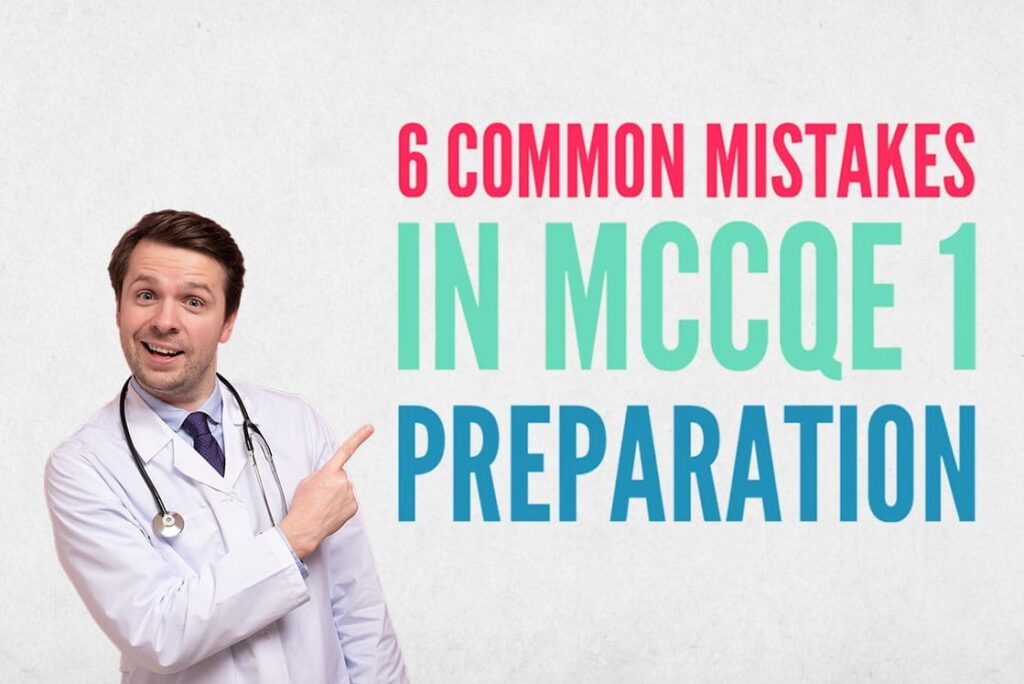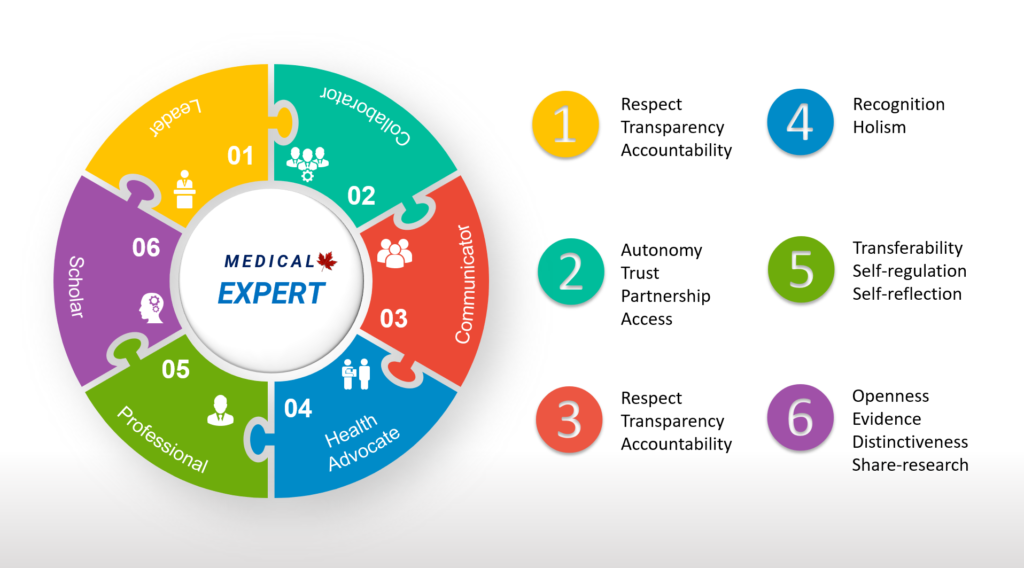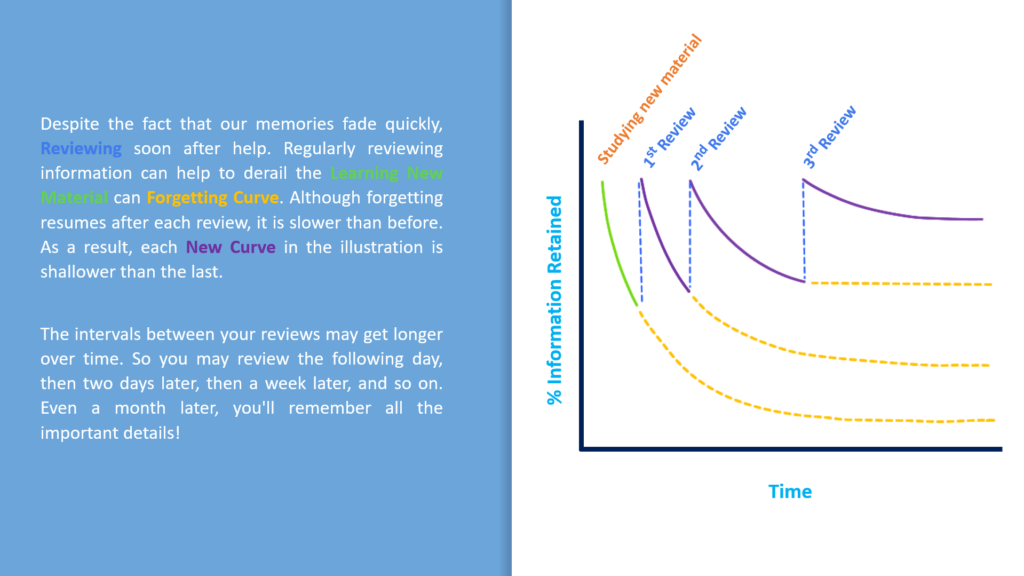6 Common Mistakes Students make in MCCQE1 Exam

According to some physicians, standardized testing to obtain board certification is more of a test of “test-taking skills” than clinical knowledge. However, we believe the most well-prepared candidate will both be knowledgeable about the examination material as well as aware of some test-taking “tips and tricks.” One can’t simply deny the fact that examinations go a long way in determining the level of medical knowledge and accuracy of clinical decision-making of their applicant. So, it is imperative to prepare well for the Medical Council of Canada Qualifying Examination (MCCQE) Part 1 exam and work on test-taking strategy.
Working hard to prepare for the examination is insufficient; one must prepare smartly. Most medical students have a poor understanding of which study tactics are most effective and routinely prepare for tests using inefficient learning strategies. So even when medical students think they’re studying effectively, the methods they’re using are actually not as useful as they believe. Later on, we will go over these strategies.
Most medical students make mistakes while preparing for examinations, and most of the time, these mistakes are caused by pressure and stress, but they can also be caused by ignorance or a lack of a proper study plan. Here, we will try to cover common mistakes made during preparation for the MCCQE 1 exam. In addition, we’ll provide you with tips on how to address them. Let’s start with the first mistake:
1. Starting too late with Ace QBank for the MCCQE1 preparation.
People are apprehensive about starting their MCCQE1 preparation with too many questions. They claim they aren’t prepared to take on a Question bank (Qbank) as challenging as Ace Qbank. They would rather concentrate on reading the textbook and covering the MCC objective before beginning Qbank. This is a terrible mistake! Here is why?
As a result, the best way to prepare for MCCQE1 is to start early with a question bank (Qbank) in your preparation to familiarize yourself with the exam format, cover the MCC objectives more thoroughly, and, last but not least, practice test-taking strategies. Ace Qbak stands out among other question banks since it is designed based on the Medical Council of Canada (MCC) objectives, includes time and tutor modes to help you practice your strategy and pace your studying, and also provides several self-assessments to assess your progress and strategies before the actual exam.
Another unique thing about Ace Qbank is the interface that has been built with you in mind, and it is user-friendly. The interface allows you to custom create as many question blocks from any discipline you like with any tag name you like without any restriction. So you don’t need to wait for the question of the discipline to finish in order to start the next discipline. You can cover multiple disciplines simultaneously.
Don’t worry about creating a mass either; the Ace Qbank interface is smart and works with you. It would not let you create a question block without giving the question block a tag name. For instance, you create 25 questions block from cardiology and name the block Cardio 1; the interface immediately lets you know how many unanswered questions you have left from the cardiology discipline. Now, you have a choice to create another cardio question block or move on to another discipline like urology, pulmonology……any discipline you feel like working on and doing questions from. Another feature is that it allows you to select a mode; you may create question blocks in either Tutor or Time mode.
The earlier you expose yourself to challenging case scenarios, the more effective your question-based learning will be later on.
2. Not reading all explanations in Ace QBank for MCCQE1 Exam.
The huge mistake one could possibly make while utilizing the Ace Qbank is to skim over question explanations. Ace Qbank’s actual value lies in its high-quality explanations. These questions are prompts and vehicles for practicing the pattern recognition, clinical reasoning, and test-taking skills that you need to score high on the MCCQE part 1 exam. However, simply answering Ace Qbank questions and skimming over the explanations is insufficient to gain mastery of the MCC objectives.
The questions in Ace Qbank are designed based on the MCC objectives and we tried to tackle every objective from a different perspective. Each question has five options, followed by an in-depth explanation of the correct answer and why the other options are not correct. The incorrect options are wrong for a reason; knowing why each potion is not correct to the presented question is extremely helpful to understand and cove the MCC objectives. In addition, it also helps you with differential diagnosis and clinical decision-making down the road.
The MCCQE1 exam is a standard computer-based exam; questions are logical, and passing the exam is feasible if someone prepares for it properly. However, properly preparing for a competitive exam such as the MCCQE part 1 exam takes time. We have included many summary tables, algorithms, and summary points to make preparation time shorter and more efficient. Combining all of these with a board-proven textbook for additional clarification on the MCC objectives is the perfect preparation strategy, and scoring well on MCCQE part 1 should be no problem.
3. Not using the right textbook for the MCCQE1 preparation.
Studying for the MCCQE Part I Exam is challenging, and this is due to the large number of Medical Council of Canada (MCC) objectives that must be covered before taking the exam. The MCC objectives are high-yield topics that candidates need to know for the board exam. Proper coverage of these objectives is essential; otherwise, the chance of passing the MCCQE1 exam becomes very slim.
The MCCQE Part I, in contrast to other international medical board examinations like the United States Medical Licensing Examination (USMLE), is considerably distinct. The MCCQE1 exam is clinically oriented and based on Canadian Medical Education Directions For Specialists (CanMEDS).
The CanMEDS was created by the Royal College of Physicians and Surgeons of Canada and describes the attributes and skills of a competent physician. The framework outlines seven roles: communicator, professional, scholar, health advocate, leader, collaborator, and medical expert. The MCC objectives are based on the CanMEDS. Objectives defined clinical diagnostics, clinical problem solving, management strategies, ethics, and preventive medicine required of the competent examinee. The list of exam objectives has been made available for a physician preparing for the MCCQE1 exam.
It can be challenging to find a single textbook that comprehensively covers the entire MCC objectives list, as different textbooks may cover different objectives or cover the same objectives to varying degrees. Some textbooks even move on to the next medical condition without going into great detail about management algorithms or mentioning key points for treatment.
On the other hand, The MCC objectives list is constantly evolving and changing to further complicate matters. As new advancements are made in medicine, the MCC objectives list is updated to reflect these changes. This means that a once adequate textbook for covering the MCC objectives may no longer be sufficient.
Given all of these challenges, candidates’ interest has shifted toward bullet point textbooks with short explanations as the primary source of preparation for the exams because these textbooks highlight all of the need-to-know information for each medical condition, allowing them to prepare for the board exam faster.
The most popular medical textbooks in this category are American ones such as First Aid or Master the Boards. A significant drawback of these textbooks is that they are not optimal for studying for the Canadian medical board exam, the MCCQE1. The MCCQE1 is a very different exam from the USMLE, and studying from a textbook that was not written specifically for the MCCQE1 can lead to confusion and frustration.
If you are a medical student or International Medical Graduate (IMG) preparing for the exam, it is, therefore, advisable to use a textbook specifically designed for the MCCQE1. A few excellent Canadian medical textbooks are available, such as Toronto Notes and Essentials for the Canadian Medical Licensing Exam. These textbooks will make studying for the MCCQE1 much easier and help you avoid confusion.
However, depending only on the textbook for MCCQE Part I preparation goes against forgetting curve theory and information retention science. During the exam, you will need to remember key facts quickly, for example, the best next step in diagnostic or management flowcharts, side effects of certain medications, or even medication contraindications for a specific age group or ethnicity, in order to make the best judgments as a physician for your virtual patient and solve the problem.
The only way to ensure that you will remember the material when it is needed is to regularly practice recalling it through active learning. This means that, in order to recall the information, you must frequently test your recall by answering questions. Reviewing material in this manner will help to ensure that you will be able to recall the information when it is needed.
Active learning, doing questions, can help you connect the points in the question stem and recall essential information necessary to help you eliminate the other option and select the correct answer in under a minute. A textbook should be used in conjunction with a question bank to help fill the gaps in explanation in the case a further explanation is necessary or cover certain objectives that are not covered in a question bank. It has been proven that practicing questions during the exam preparation time improves long-term memory and enhances the recall of crucial knowledge during the exam.
Ace Qbank has designed based on the MCC objective with a Canadian physician to facilitate preparation for the exam and has incorporated the time and tutor mode to further assist with preparation for the MCCQE Part I and enhance recall of critical information during the exam. Ace Qbank aims to replace the requirement for the textbook during the MCCQE1 exam preparation by providing in-depth explanations, various summary tables, flow charts, hyperlinks, and mnemonics for crucial material. Ace Qbank also offers Clinical Decision Making (CDM) cases to help with the CDM part of the MCCQE1 exam and MCCQE1 self-assessments to help you assess your readiness for the actual exam.
4. Procrastinating on learning new content for the MCCQE1 exam.
Procrastination is really powerful. Anyone, at any time, can become a victim of this. It’s as if a voice inside your brain keeps coming up with excellent ideas for things to do right now rather than study: I really should clean up this room before I study, or I can study anytime, but today is the only chance I have to accomplish X. That voice is also extremely excellent at rationalizing: “I don’t really need to read that chapter right now; I’ll have plenty of time tomorrow at lunch…”
When you purchase a subscription, you have a certain amount of time to finish, review the question bank and assess your progress before the MCCQE1 exam. It is an asset to know how to combat procrastination when it threatens to hinder you from completing your academic assignment.
Time management:
You can’t just “go with the flow” and hope that you have enough time and energy left over for studying after spending time with friends. Prepare a study schedule that will give you enough time to complete your assignment. When you have only a limited time to study, make the most of your limited study time by reading as much as possible.
Motivation:
It is one of the most effective ways to combat procrastination. Staying motivated helps you to follow your study plan and increase your productivity during the day.
Avoid temptations:
Reduce temptations if you can’t resist them. You need to consider studying in a library if you get distracted by the possibility of talking to your spouse, roommate, or family members because you study at home.
Questions answered wrong should not be taken lightly; these are the weak area that needs to strengthen and need your immediate attention. Investigate by reviewing the explanation of the wrong answered questions and try to figure out whether it was the knowledge (something you did not know) or you were speeding (did not pay attention). Procrastinating when it comes to learning new content never had a good ending in the academic world.
The core of time management is planning ahead of time and then sticking to your plan. To establish the best study habits, organize both your space and your time. Learning how to remain on track, avoid distractions from people and technology, and minimize procrastination will bring success. In contrast, attitude is the most important factor determining success in preparing for the MCCCQE1 exam. Maintaining a good attitude and surrounding yourself with positive individuals can help you stay motivated to do the activities that will help you succeed in the exam.
5. Doing the Ace Qbank in a rush for the MCCQE1 exam
You’ll get the most out of your subscription if you get to work on questions right away after creating a question block. Your chance of finishing the question bank and reviewing it several times will be much higher. Memory creation is an important cognitive process that allows us to store and recall information. A review allows you to refresh your memory on what you just read and process key concepts, and enhance the recall of information.
The question explanation uses a combination of hyperlinks, illustrations, and summary tables to explain the complex medical concept. The options after each question stem are not chosen at random. Each one exists to create the illusion of the correct answer, and they are put in a certain order for a reason.
It is unwise to rush through the explanation or to skip it altogether because the question was correctly answered. The questions in Ace Qbank are high-yield questions, and each question took a substantial amount of time to develop by an expert physician to ensure excellent coverage of the MCC objectives. The best strategy is to choose your MCCQE1 exam based on your study plan and take your time going over the explanations and covering the whole question bank.
6. Inadequate preparation time for the MCCQE1 exam.
Preparation time should be dedicated time. Cut out the distractors; many students intend to study but easily get distracted with surfing the Internet, checking social media, watching YouTube videos, or receiving a text message. If you don’t absolutely need your cell phone for your study, why not put it on silent mode or turn it off. Notifications of text messages, emails, or social media updates can all serve as a major distraction to your studying. We neither endorse nor encourage cramming for the MCCQE1 exam.
You’ll have to schedule your study time properly. Plan out your study time. Make a list of the subjects you plan to study, along with a time frame for each. Leave room for breaks and “free time.” Your life and studies will be easier to manage. Following a schedule gives you structure, which improves your efficiency and reduces your stress.
As you study, keep your goals and priorities in mind, and prioritize what is most important to you. Time management is primarily a way of balancing priorities in order to achieve all of your goals. When you manage your time properly, you don’t have to entirely disregard certain goals in order to achieve others. In other words, registering for the MCCQE1 exam does not require you to give up your life, but you may need to focus on managing your life more efficiently and setting priorities in order to pass the MCCQE1 exam as a basis for time management. The objective of time management is to complete three hours of learning in three hours while still having time for your life.
There are thoughts that often blow up any time management:
Obsessive thoughts:
Be aware of obsessive thinking when studying for the MCCQE1 exam. If you find yourself obsessing on your incapacity to answer questions, the volume of material, or your ability to pass the exam, try distracting yourself with something else to think about. Keeping your attention on a limited task, such as the objective you’re presently studying, can assist you from allowing obsessive ideas to distract you.
Negative thoughts:
Negative thoughts and feelings are difficult to avoid. In contrast, negative self-talk that “I can’t pass this exam” increases exam stress and is unproductive.
Be aware of these two thoughts, they will blow up your time management if you let them, but the best antidote for them is a combination of self-confidence, a positive attitude, and motivation. Remember, there have been many ahead of you, so the MCCQE1 exam is possible!
Need Help With Your MCCQE 1 Exam Preparation?
Proper preparation is essential for success on the MCCQE1 exam, and you should make every effort to earn the maximum possible score on the MCCQE 1 exam. If you’re having trouble keeping to your study plan or if certain objectives are challenging for you, get the help you need to pass the MCCQE 1 exam on the first attempt.
Ace Qbank has got your back with over 2000+ high yield questions, many Clinical Decision-Making (CDM) cases, and several self-assessments available to challenge and push you to your limit.
To facilitate preparation for the MCCQE 1 exam, we developed the Ace Qbank based on the Medical Council of Canada (MCC) objectives. Our team reviews the question bank regularly based on current guidelines and recommendations, and we implement any changes we make as soon as possible to enhance your learning experience. Our objective is to keep the information up to date and in compliance with medical standards of care to avoid surprises during the test. At Ace Qbank, we’ve got you covered.
We invite you to sign up for the Ace Qbank demo today and see the difference our elite question bank makes!










